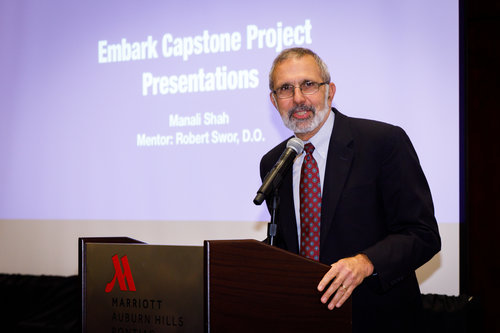
The Oakland University William Beaumont School of Medicine is working with Michigan Medicine through a new research program aimed at preventing brain damage caused by cardiac arrest.
The research program is called Michigan Resuscitation Innovation and Science Enterprise (M-RISE).
M-RISE aims to improve cardiac arrest survival through unique therapies including a medication to protect the brain during cardiac arrest that can be delivered as a nose spray or injection during CPR. In addition, by studying bystander and first responder activations for CPR, they’ll identify, test and implement new recommendations and interventions in the community to optimize time to CPR and defibrillation.
OUWB’s Robert Swor, D.O., professor of emergency medicine, is part of the six-member team guiding M-RISE — awarded a five-year grant about a month ago from the American Heart Association’s Arrhythmias and Sudden Cardiac Death Strategically Focused Research Network.
“I think it’s a great opportunity to work to improve care for the community and to work with the University of Michigan to enhance our research infrastructure (at OUWB),” said Swor.
Improving post-cardiac arrest neurologic function
Swor has been working with the members of M-RISE for more than five years through various research projects, as well as SaveMiHeart, a statewide initiative with a goal to double cardiac arrest survival in Michigan by 2020 by using bystander (hands only) CPR.
M-RISE is housed at Michigan Medicine under the Michigan Center for Integrative Research in Critical Care (MCIRCC), which works to transform crucial care through innovation, integration and entrepreneurship.
“We envision a future in which the American Heart Association’s goal of doubling cardiac arrest survival is achieved, which could save 100,000 lives each year in the U.S. alone,” said Robert Neumar, M.D., Ph.D., who is leading M-RISE. “By optimizing the timing to bystander intervention and making new therapies available for people providing CPR we hope to significantly increase the number of out-of-hospital cardiac arrest patients that survive to lead normal lives.”
Per the program abstract, less than one in 10 patients treated for out-of-hospital cardiac arrest survive with good neurologic function.
Swor said the goal is for M-RISE to fill current gaps and overcome existing barriers that have historically prevented therapeutic advances in cardiac arrest care.
M-RISE’s strategy to achieving its objective of preventing brain damage caused by cardiac arrest is based on four guiding principles:
- Restoring blood flow as soon as possible following cardiac arrest with early CPR and defibrillation is the most effective strategy for preventing brain damage caused by cardiac arrest.
- Neuroprotective therapies are most effective when delivered within minutes after a cardiac arrest has occurred.
- Neuroprotective therapies that can be delivered by bystanders and first responders will have the greatest potential to prevent brain damage after an out-of-hospital cardiac arrest.
- Successful clinical trials demonstrating neuroprotective therapies that can be delivered by bystanders and first responders to out-of-hospital cardiac arrest patients and can be implemented as safe and easy-to-use therapies with minimal to no prior training for bystanders.
M-RISE includes three projects, a postdoctoral training program and an institution collaborator, which is OUWB.
In its role as the institution collaborator, researchers will work with OUWB to grow its medical research program focused on resuscitation science. Swor will help foster collaboration between the universities.
The three research projects are divided into a basic, clinical and population science focus and build upon work performed in the previous project — a translation research model, according to the program.
The basic science project team will study neuroprotective agents that can be given intranasal and intramuscularly during cardiac arrest in animal models. They hope to determine the lowest doses that achieve the maximum treatment effect when given during CPR and how timing of the administration impacts neuroprotective effects.
The second project team will work with the U.S. Food and Drug Administration to determine a regulatory pathway for a future trial of bystander and first responders administering intranasal neuroprotective agents to those suffering an out-of-hospital cardiac arrest. The team will work with Sanderson’s team to use its preclinical data when developing an application for an investigational new drug.
The last project team will work with the University of Michigan Medical School Department of Learning Health Sciences, the U-M Clinical Simulation Center and the Washtenaw-Livingston County Learning Health System, and their stakeholders, to identify barriers and facilitators to shortening time to treatment during out-of-hospital cardiac arrest. The groups will first use a learning health system approach to optimize time to CPR and defibrillation and then use this infrastructure, along with simulation-based training and assessment, to inform implementation strategies for early intranasal and intramuscular therapies.
Fellows will be able to work on each research project, as well as work with OUWB faculty on clinical and educational experiences, such as ride along care with emergency medical service providers.
M-RISE is actively recruiting qualified scholars and fellows from across the country. Interested applicants can contact MCIRCC to apply.

